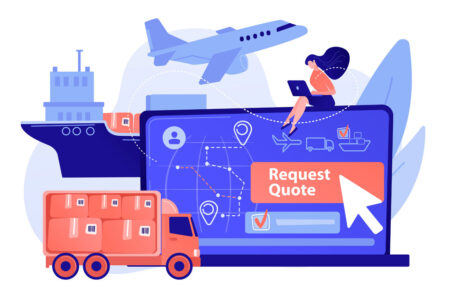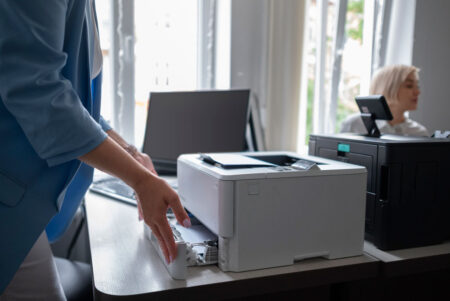If you need a copy machine, you have two options for getting one: You can buy it outright or lease one. Before making a decision, understand the pros and cons of buying versus leasing.
Regardless of the industry your business operates in or its size, there is likely a good chance that paper documents have some sort of role in your business. And while many organizations are making an effort to reduce their paper use to become more eco-friendly, printing a contract, presentation or a simple spreadsheet is something many still need to do. When it’s time to invest in an office copier, which for many these days doubles as an office printer, for your business, a good place to start is assessing the needs of your organization.
Would you prefer to own and maintain your equipment for the long haul, or does it make more sense to pay a steady monthly bill to lease the latest tech with regular updates and scheduled maintenance? There are benefits and drawbacks to either route, and understanding the differences could be critical to how your business operates in the future.
Editor’s note: Looking for the right digital copier for your business? Fill out the below questionnaire to have our vendor partners contact you about your needs.
What are the pros and cons to buying a copier?
Depending on the type of digital copier you are considering, buying one outright can be quite expensive. However, while there will be a big initial outlay of cash, there are some definite benefits to buying a copier outright.
Pros
If you’re planning on using the copier for several years, you may be better off buying one outright. While the upfront charges of purchasing a copier may be a bit painful, you won’t be hit with finance charges or monthly bills. Better yet, once it’s paid for, it’s yours to own and operate. Buying a copier is recommended for businesses that need to customize or change the hardware, and if that’s not enough, the costs could be used as a tax write-off.
According to Arizona Business Equipment, a copier lasts three to five years. However, with regular upkeep, you could extend the life of the machine. And with a machine that’s still in working order, you have something you can sell or trade in to help offset costs when you upgrade to the latest and greatest hardware.
Cons
The downside to purchasing a copier is the costs associated with maintaining the equipment. Regular maintenance and repairs are separate costs when you own a copier, but you can usually find a local copier service that can help you. In fact, larger operations that need more than 10 copiers purchase the equipment with a separate regularly scheduled maintenance program to help sustain performance and extend its lifespan, all at a lower cost than leasing.
Tip: If you plan to buy a copier, check to see if maintenance service plans can be purchased at a discount to help offset some of the routine service that will be required over the years.
What are the pros and cons of leasing a copier?
Leasing is an appealing option for businesses that don’t have a lot of cash to spend on a machine. However, while it reduces your initial costs, there are some downsides to this type of financing.
Pros
Leasing is a great option for businesses that only need one or a few copiers. With plans that don’t require a down payment, a lease doesn’t eat into your cash flow the same way that purchasing a copier does. Leasing can include service updates to the copier, as well as a maintenance service plan, with representatives providing regular upkeep to maintain maximum performance.
When you lease a copier, you reduce the small maintenance charges that accrue when you’re repairing or replacing parts, regularly upgrading to a newer model, or dealing with consumable inventory like ink and paper. If you already know how much your workforce is printing, you can easily find a lease with all of those must-have options included, so not only are you getting the latest and greatest hardware, you also have a single solution that provides everything you need through one vendor.
Did you know? Leasing a copy machine helps ensure that you are using some of the most up-to-date technology, as you can easily upgrade to new models when your lease expires.
Cons
Just like any other contract, when you lease a copier, the devil is in the details. With a long-term copier lease, it could be more expensive over time compared to buying a copier because of the ongoing monthly fees. Additionally, leasing periods are sometimes locked in for a few years at a time to provide the “best value,” with a severe penalty for terminating the agreement early. However, while some office equipment providers offer leasing options for shorter periods to cater to smaller startups, the pricing on those short-term deals isn’t usually cost-effective.
Copier Lease FAQs
What is the average length of a copier lease?
The most common copier lease agreement has a 36-month term. Copier leases tend to be broken down in annual terms, starting from 12-month contracts and going all the way up to a 63-month contract. When you are considering leasing options for an office copier, make sure you’re dealing with a reputable service. Look at all of the options that are available to you, and always read the fine print of the contract to make sure you’re not agreeing to strict, limited terms.
What is the average cost to lease a copier?
The cost to lease a copier varies. It can cost as much as $650 per month, so understanding your business needs is an important first step. If you only need a no-frills copier for a minimal amount of copying and printing, you can find a solution for as little as $100 per month. If your business demands a full-color multifunction copier that can scan, fax, organize, staple and collate volumes of documents, that’s when things can get pricey. Take your time to understand all of the different considerations to find the right copier for your needs.
What speed should I look for when leasing a copier
The copier speed you should look for is dependent on how many copies you need to make. If you’re only printing or copying a few documents a day, you could probably get away with a copier with a speed of 20 pages per minute (PPM) or less. But keep in mind, 20 PPM is slow – most offices use printers that have a 40 PPM rating, while higher volume organizations may need a copier with a rating of 40 PPM or higher to keep up with the demand, but those are usually specialized (and expensive) solutions.
Buying or leasing a copier isn’t too different from buying or leasing a car. There are costs of ownership and upkeep when you own it, but knowing you don’t have to make monthly payments on the hardware is incredibly satisfying. Leasing, however, allows you to regularly treat yourself to the latest and greatest gear at a consistent rate for years to come.


